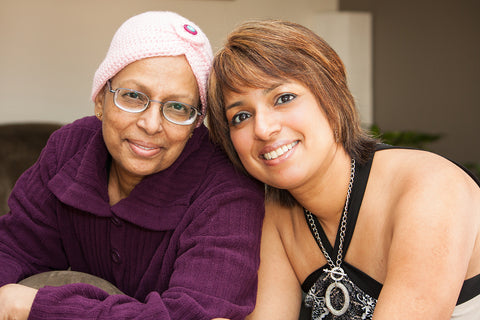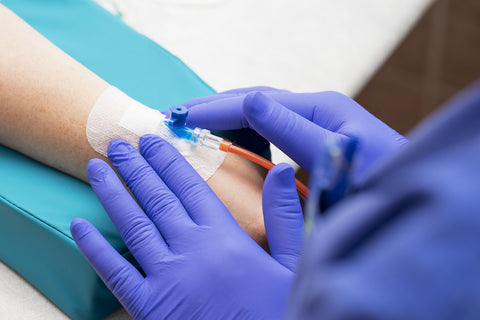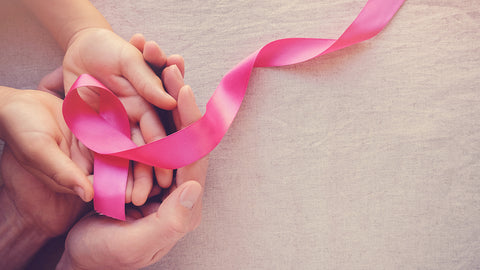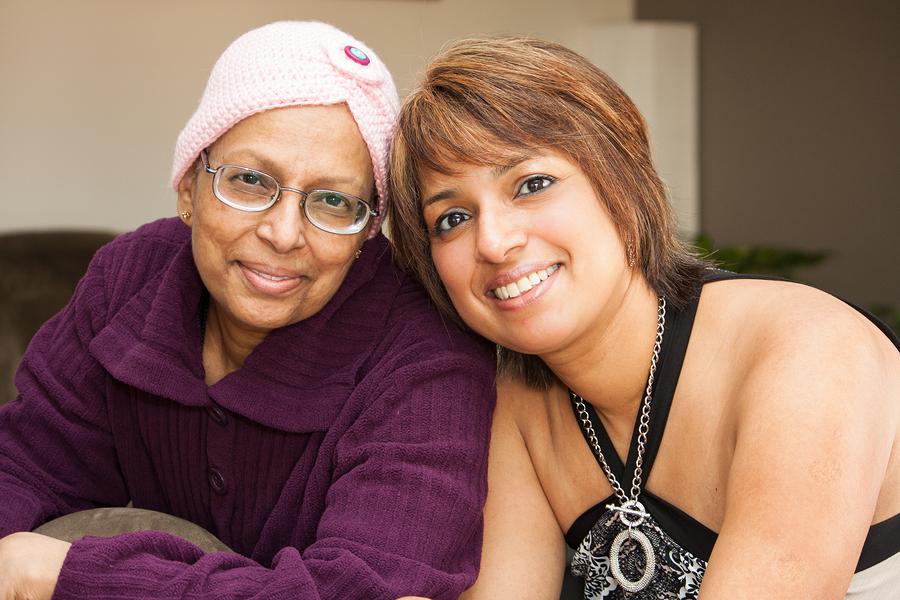According to the American Cancer Society, anxiety is one of the most common emotions cancer patients experience following their diagnosis. On top of the worry, chemotherapy can leave patients with severe fatigue.
When it comes to dealing with anxiety and stress, weighted blanket therapy may often be helpful. Here’s everything you need to know.
Weighted Blanket Therapy and Cancer

Weighted blankets, which are made to equal about 10 percent of a person’s body weight, deliver firm but gentle pressure all over the body. This pressure is actually a form of therapy called deep pressure touch stimulation. It’s a long name for something that’s really quite simple. Research has shown that applying pressure (like the kind you get from a tight hug) prompts the body to release serotonin — the “feel good” chemical in the brain.
When you’re anxious, serotonin can help you feel calmer and more relaxed. There is also a link between serotonin and a lower risk of depression. When researchers study weighted blankets, they find that people feel less anxious and better rested when they use them.
According to WebMD, people who already suffer with an anxiety disorder can experience heightened anxiety upon receiving a cancer diagnosis. It’s also extremely normal for cancer patients to develop anxiety — after all, cancer can be a scary thing, and it’s a completely understandable reaction to getting a diagnosis that carries a lot of weight with it.
6 Tips for Easing Chemo Anxiety
While a cancer diagnosis and chemotherapy can definitely take a toll on your mental health, there are ways you can manage the anxiety so you can focus on your treatment and look forward to recovery. Here are six tips for easing cancer and chemo anxiety, including using a weighted blanket to help fight fatigue and increase comfort.
1. Knowledge Is Power

According to the Mayo Clinic, getting the facts can help ease cancer and chemo anxiety. There are many different types of cancers, and routine treatment regimens common for one kind of cancer may not work for a different type of cancer. This is why it’s important to ask plenty of questions and arm yourself with knowledge.
When it comes to getting answers, your health provider is usually the best resource. While the internet is filled with information, not everything you read will apply to your case. There’s also a risk of reading something that is incorrect or misleading. The Mayo Clinic recommends writing down your questions before you meet with your doctor or provider, as it’s easy to forget your concerns when you’re in the doctor’s office.
When you surround yourself with facts, it’s easier to fight doubts and anxiety when they start to creep in. Eventually, you might even become a trusted resource for friends or family members who receive a cancer diagnosis.
2. Get Enough Exercise
You already know that exercise is important — for just about everything! As it turns out, getting enough exercise can also help you combat the anxiety and fatigue that often go hand in hand with cancer treatment.
While chemo can definitely make you tired, the American Cancer Society says that appropriate exercise may help you maintain muscle tone and cardiovascular health as you go through treatment. Talk to your doctor about what types of exercise are ideal for you. If you’re normally an avid runner, you might have to scale back to jogging or brisk walks for a while. Or if you love intense weight training, your doctor might recommend switching to a more manageable weight.
Whatever type of workout you choose, the important thing is to keep moving. Regular exercise may even help shorten your cancer treatment, according to the American Cancer Society.
3. Practice Self-care
Studies show that self-care can improve outcomes for cancer patients. In today’s busy world, many of us push our personal and emotional needs to the side in favor of working longer hours, tending to family demands and making sure everyone around us has what they need to function and feel their best.
When you’re going through cancer treatment, it’s important to prioritize your own needs. Self-care doesn’t have to mean getting a massage, although it certainly can if that’s what makes you feel your best. For some people, practicing self-care means taking a walk every evening after dinner, or reading a book they enjoy. For others, self-care is indulging in a long bath with an aromatherapy candle.
However you choose to practice self-care, make sure to develop a routine that refreshes and restores you. This is an area where using a weighted blanket can boost your go-to self-care practices.
4. Connect with Others Who’ve Been There

Cancer experts also recommend talking to someone supportive, which often means connecting with a cancer survivor or a group of people who have gone through the same type of treatment. Your medical provider may be able to put you in touch with a support group in your area, so you can meet with others in person. If that’s not possible, or if you prefer chatting with others online, there are also plenty of message boards and support groups available on the web.
When you have a serious disease, it’s normal to feel lonely. Even your close friends and family members might not quite get what you’re going through. By speaking to someone who’s been through the same experience, you might feel less isolated.
5. Learn Your Anxiety Triggers
When mental health experts give tips for combatting anxiety, they almost always recommend learning your triggers. The nice thing about this tip is that it applies to all types of anxiety, and it’s something you can use long after your treatment is complete.
It’s a natural human instinct to avoid things that scare us. For example, if you’re terrified of bees, you’re unlikely to visit a bee farm anytime soon. Or if you hate scary movies, you probably aren’t volunteering to accompany friends to the latest Stephen King movie. Got a fear of heights? Chances are you haven’t gone rock climbing lately.
While it’s quite normal to stay away from fear and anxiety triggers, doing so can actually make our fears and anxieties worse. Experts say the first step to overcoming anxieties is pinpointing what triggers them in the first place.
If you’re going through cancer treatment, try to identify the things that make your anxiety peak. For example, going for a blood test or scan might provoke an anxiety attack. If that’s the case, try to find ways to reduce your anxiety. You might schedule your appointments first thing in the morning so you don’t have to wait all day for your scan. Another strategy is to take a support person along to your appointments.
Once you know your anxiety triggers, you can also try deep breathing or using a weighted blanket or wrap when you feel your anxiety building.
6. Fight Cancer Fatigue with a Weighted Blanket
As researchers state, “Fatigue is highly prevalent among persons with cancer and has great impact on their lives.” When you’re going through chemo and other types of cancer treatment, it’s normal to feel tired, drained and downright exhausted. Worse, cancer treatment can also lead to insomnia, which means it’s difficult to fall asleep just when you need it most.
This is where weighted blankets may help. According to a study published in the journal Occupational Therapy in Mental Health, weighted blankets help reduce the physiological signs of stress, including lowering blood pressure and improving pulse rate. In the study, 63 percent of participants reported lower anxiety levels and 78 percent preferred the weighted blanket as a calming modality.
SensaCalm: Weighted Blanket Therapy for Chemo Anxiety
If you’ve been diagnosed with cancer, a weighted blanket may help ease the anxiety you feel about going through treatment and getting better. Order your custom weighted blanket today. If you want a weighted blanket ASAP, you can also browse our ready-to-ship finished blankets. Many cancer patients also love our weighted wraps, which can drape around the shoulders or over the legs.
Got questions about which weighted blanket, wrap or weight is right for you? We’re happy to help. Just give us a call at 855-736-7222 or use our contact form to get in touch with one of our knowledgeable team members.
Disclaimer: The content on this website is not intended as a substitute for medical advice. Talk to your doctor or healthcare provider before undertaking any type of therapy or treatment.


